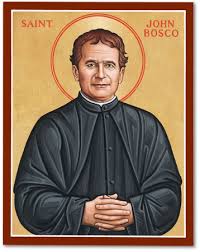HOMILY WEEK 03 05 – Year II
Faith Like A Mustard Seed:
Memorial of St John Bosco
(2 Sam 11:1-17; Ps 51; Mk 4:26-34)
*************************************
The Gospel for today features the parable of the mustard seed. Bishop Robert Barron starts us off with this reflection:
How does God tend to work? From the very small to the very great—and by a slow, gradual process. God tends to operate under the radar, on the edges of things, quietly, clandestinely, not drawing attention to himself.
C.S. Lewis speaks to this principle. How, he asks, did God enter history? Quietly, in a forgotten corner of the Roman Empire, sneaking behind enemy lines. How was European Christianity established? Through the handful of people that listened to St. Paul in Philippi and Athens. How did the mighty Franciscan movement come to be? One odd, mystical kid who heard a voice coming from a crucifix: “Francis, rebuild my church, which is falling into ruin.” A handful of followers joined him in his quixotic project, then dozens, then hundreds, then thousands.
So don’t be afraid to do small things at the prompting of God! Plant the seed, make the move, take the risk—take even the smallest step, and don’t worry about who notices or how much attention you’re getting. Sow the seed and leave the rest to the mercy and providence of God.
To his reflection I add one of my own on the first reading today that recounts the familiar story of the sin of David – basically lust, adultery and arranging a murder. Certainly, shocking for anyone, but especially a king whose troops are defending his nation, and who is supposed to care for all his people.
The point of this whole story, the underlining of the seriousness of David’s transgressions, is to underline in its turn the magnanimity and greatness of God’s compassion and unconditional love, which we will see David experiences when confronted by the prophet. It is that experience of God’s mercy through forgiveness, and David’s sincere, heartfelt repentance, which transforms David into the only true King Israel ever had. That also sets up the stage for the transformation in the New Testament of both Saints Peter and Paul into who they were – also through forgiveness. That should give us encouragement to allow God to do the same in our lives, whatever our past sins and mistakes have been.
 Someone who certainly lived today’s readings, and especially encouraged youth to life a new way of life, is St. John Bosco whom the church honors today. Known to many as Don Bosco, this patron saint of youth was born in Piedmont, Italy, in 1815. Raised in poverty, John was ordained in Turin in 1841. After witnessing the circumstances of boys living in a local prison, he resolved to devote himself to working among disadvantaged boys – children living on the street, juvenile delinquents and any child wo was suffering because of some disadvantage.
Someone who certainly lived today’s readings, and especially encouraged youth to life a new way of life, is St. John Bosco whom the church honors today. Known to many as Don Bosco, this patron saint of youth was born in Piedmont, Italy, in 1815. Raised in poverty, John was ordained in Turin in 1841. After witnessing the circumstances of boys living in a local prison, he resolved to devote himself to working among disadvantaged boys – children living on the street, juvenile delinquents and any child wo was suffering because of some disadvantage.
John formed the Salesian Society, named Francis de Sales, and began educating boys of the poor and working classes, holding evening classes in factories, in fields or wherever there was a need. John believed in equipping boys for life in the world and trade schools soon formed a large part of Salesian training. A progressive thinker, he abhorred all punishment, believing that by removing youth from temptation, treating them with dignity and kindness, and enriching them with skills, they could lead more productive lives. His rule was “Not with blows, but with charity and gentleness must you draw these friends to the path of virtue.” With the help of St. Mary Mazzarello he also established the Salesian Sisters to do similar work among girls. John Bosco died in 1888 and was canonized in 1934.
The Eucharist is both a present experience of God’s mercy as forgiveness and healing, and also an experience of the mustard seed in our own lives – an act of faith that will transform us into followers of Jesus like St. John Bosco.




It is a great homily and reflections growing in faith like the mustard seed. We hope the youths and young peoples would hear the word of God and understand it. Many of them will learn from ancestors , elders , adults and parents about who is God and what kind of person is God. We need to know what is Jesus’ mercy comes from pain and suffering when died on the cross. We need to understand why he died on the cross . He did it to complete his father’s mission and as a way to live out his word . It is to show us what is forgiveness and healing when we hurt people and committed any sins against God. If we sinned against God and the law ; we need to know what to do to ask God to forgive us and transform us to be his follower. We should be able to move forward and grow like the mustard seed. We should take St. John Bosco as an example as he worked with those youths and boys. Amen. Thanks be to God.
Thanks Bishop Sylvain Lavoie for all reflections and stories . There are many valuable lessons and teachings young people should encounter and deepen their faith to be closer to Jesus Christ. It is beautiful. Gracias! ???????✝??❤️❤️?